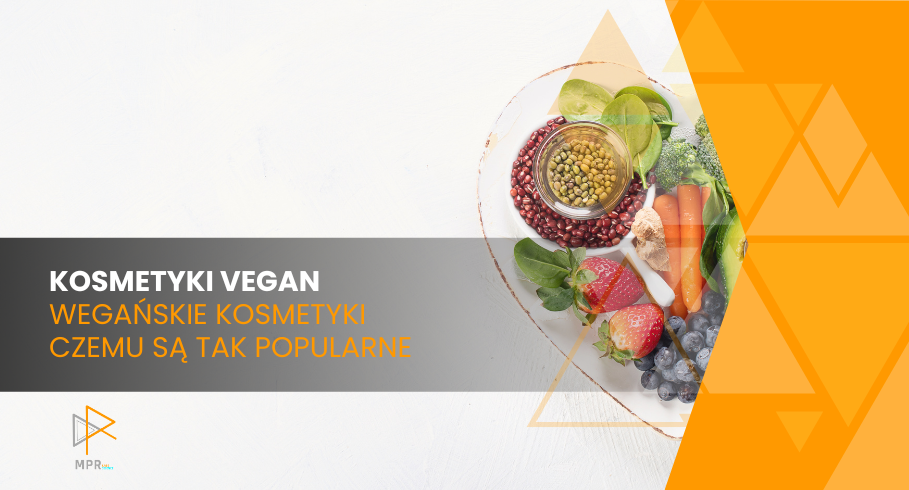
Vegan cosmetics
One of the hottest trends of recent years has become veganism, which has very quickly become a permanent fixture in the beauty industry. "Vegan beauty", i.e. products without animal ingredients, are now something very common on shop shelves. There is also a growing awareness among consumers who, out of concern for the environment, choose products that fit in with this trend. The vegan cosmetics market is divided by product type into facial cosmetics, eye cosmetics, lip and nail make-up products and hair styling and colouring products.
Key market trends
The market for vegan, vegetarian and cruelty-free cosmetics has developed significantly in recent years. Consumers pay attention not only to the appearance, but also to the composition and origin of the cosmetic product ingredients. In addition, many celebrities are encouraging a vegan lifestyle and buying such cosmetics.
Some global companies, to match market expectations, have been inclined to produce laboratory-grown human skin samples for product testing. The ability to create such samples reduces costs and allows for increased accuracy of results.
Due to increased consumer awareness of the harmful effects of certain compounds on the environment, there is an ever-growing demand for natural or organic products. Shoppers are looking for brands on the shelves that rely on natural and ethical ingredients, leading to an increase in sales of vegan cosmetics. The high demand for vegan ingredients has led most companies to permanently introduce vegan cosmetic lines into their 'portfolio', containing nature-inspired ingredients combined with their multifunctional properties.
In addition, research shows very well that younger consumers, the so-called millenials (born in the 1980s and 1990s) and generation Z (born after 2000), are the main drivers of the vegan cosmetics market, as these are the people among whom the trend towards a plant-based diet is taking hold. Many of them are setting up their own manufactures that operate according to vegan beliefs.
Global vegan cosmetics market
According to a study, the global market for vegan cosmetics reached around $15.1 billion in 2020. It is estimated to gain $21.4 billion by 2027. The US Vegan Cosmetics market is estimated to reach $4.1 billion in 2020. China, the world's second largest economy, is projected to gain a projected market size of $4.4 billion by 2027. Other noteworthy geographic markets include Japan and Canada, each projected to grow by 2.8% and 4.6% respectively between 2020 and 2027. In Europe (Germany), growth is speculated to be around 3.2% CAGR (compound annual growth rate).
COVID's impact on the vegan cosmetics market
In the wake of the COVID-19 crisis, the global vegan cosmetics market, estimated at $15.1 billion in 2020, is expected to reach an adjusted size of $21.4 billion by 2027, growing at a 5.1% CAGR (cumulative annual growth rate) over the analysed period 2020-2027. Such significant growth is due to a change in consumer preferences during the pandemic, as they began to seek out healthy cosmetic options, as well as through increased online shopping. The COVID epidemic has presented people with new challenges. Their approach to life changed diametrically. Due to the long-lasting lockdown, many of us had to cope on our own with what we were supported with on a daily basis by specialists in hair or beauty salons. Therefore, a great need arose to look for products that could successfully replace professional treatments. Consumers began to look for healthy and effective skincare products, which are vegan cosmetics.
Today's buyers are geared towards innovative products based on natural ingredients. There is an ever-increasing demand for natural hair colours, for example, so manufacturers are placing great emphasis on vegan and toxin-free ingredients in hair colouring and care products that can be easily and safely applied at home.
Sales channels for vegan cosmetics
The sale of vegan cosmetics is mainly determined by the emergence of new sales channels, which make them easily accessible and visible to the potential consumer. Currently, the most popular form of purchase is online sales. According to the GVR report, China saw more than 65% growth in online sales of vegan cosmetics in 2011.
A key way to get to know a brand is through the very frequent natural cosmetics fairs, where there is the opportunity to test the product and have direct contact with the specialists who develop the recipes or even purchase the product.
Drivers of consumer purchasing decisions
The sale of cosmetics is based on building the trust of customers, who, thanks to the knowledge they have gathered about the brand and the product, make conscious decisions to buy it. The return to naturalness is a slogan that has become the bestseller of recent years in the world of the cosmetics industry. It is not only the natural and innovative ingredients that induce the consumer to buy a cosmetic, but also the way the product is presented, i.e. the so-called advertising. Cosmetics for vegans are labelled as 'Vegan', 'Vegan friendly' and 'vegan'. The packaging of such products more and more often contains various organic certificates, which are quite a challenge for the manufacturer to obtain, but inspire a lot of confidence among buyers. The most common on the Polish market are the labels The Vegan Society and Viva!
The future of "vegan beauty"
The pursuit of nature and care for the environment has become a huge movement in the cosmetics industry - and it doesn't seem to be going away any time soon. The consumer's awareness and interest in choosing a product drives the manufacturer to keep improving and ethically creating the cosmetic. The market for vegan beauty products is expected to grow exponentially, and it is very likely that more and more brands will take notice - not only as a way to stay competitive in a fast-growing industry, but also in response to the demand for a more thoughtful approach to how our collective practices affect our world.